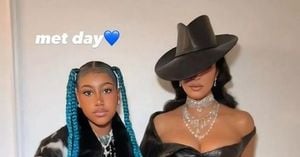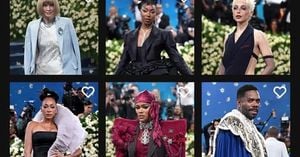Usha Vance, the wife of Republican vice presidential nominee JD Vance, recently defended her husband’s controversial remarks about "childless cat ladies" during her first solo interview since he was selected to run alongside former President Donald Trump. This interview aired on Fox News and quickly drew attention, especially as it coincided with renewed scrutiny of JD Vance's past comments, which critics claim have been dismissive of childless individuals.
During her interview, Usha emphasized her husband's intention behind the remark, arguing it was made to highlight the challenges faced by parents rather than to demean those without children. "What he was really saying is it can be really hard to be a parent in this country, and sometimes our policies are done in ways to make it even harder," she explained. Usha depicted the comment as more of a quip—an off-the-cuff remark—than anything deeply offensive.
The phrase “childless cat ladies” originated from JD Vance’s comments back on Tucker Carlson’s show, where he suggested the political leadership of the country was heavily influenced by those without children—implying they lacked the same stake in society’s future. He called out Democrats, labeling notable figures including Vice President Kamala Harris and Congresswoman Alexandria Ocasio-Cortez as representing a demographic of the "miserable" childless. Though he clarified this comment by advocating for stronger policies to support families, the surrounding language created considerable backlash.
Critics were quick to respond, with prominent figures such as the editorial board of The Wall Street Journal criticizing his statement as condescending and out of touch. This backlash led to discussions about whether it might affect Trump’s campaign, especially among voters concerned about the tone and content of such remarks. Conservative commentator Ben Shapiro raised speculation about whether Trump might reconsider his vice presidential pick, hinting at potential doubts about Vance.
Usha Vance’s rebuttal was not merely about defending her husband’s humor but attempted to steer the conversation toward systemic issues faced by families today. "I think what I would say is, let’s try to look at the real conversation he’s trying to have and engage with it. For the many of us who want to have families—and for whom it’s really hard—what can we do to make it better?" she urged, aiming to redirect the focus onto meaningful dialogue about family policy.
During the interview, Usha also touched on the emotional toll of negative publicity surrounding her husband’s remarks. She shared her strategy for coping with the press's portrayal of JD, noting how the scrutiny has helped her toughen up. Usha remarked on the necessity of positivity at home amid the surrounding negativity, stating, "I just think he deserves to have someone in his life who hears straight from him and doesn’t just hear what other people are saying about him.”
Aside from defending JD's remarks, Usha shared insights on how the family is adjusting to their spotlight existence since JD was chosen as Trump’s running mate. She recounted how their children are adapting to having Secret Service protection, joking about their excitement to choose their code names. Yet Usha maintained the perspective of wanting their children to grow up largely out of the public eye, emphasizing the importance of preserving their childhoods amid the political whirlwind.
Usha’s nuanced defense of her husband also reiterated the importance of securing family-oriented policies and recognizing the different avenues people choose when it come to parenthood. She acknowledged, "I also understand there are many reasons why people may choose not to have families, and many of those reasons are very good"—a statement aimed at bridging what could otherwise be seen as divisive comments surrounding family and childlessness.
The response JD Vance received demonstrates not only the scrutiny politicians face as their words come under the microscope but also the implication of these comments during high-stakes campaigns. With the 2024 election approaching, discussions around these issues will likely continue, and how this family maintains its focus could prove significant.
Ultimately, JD and Usha Vance stand at the forefront of tackling issues on family and leadership, all the meanwhile walking the fine line between personal beliefs and public perception. Their willingness to engage with the challenges of parenting and non-parenting decisions may form the crux of their message as they campaign together.



